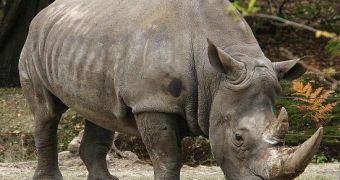Green group WWF (World Wildlife Fund) has decided to help Kenya protect its remaining rhino population against poachers by giving the country enough money to purchase 1,000 microchips that are to be implanted in the animals' bodies and thus make it easier for rangers to keep tabs on them.
In case anyone was wondering, Kenya will receive money for only 1,000 such microchips and the scanners that go with them not because the WWF is cheap, but because the country is now home to merely 1,000 such animals.
Information shared with the public says that the chips will be implanted in the rhinos' horns. This way, the Kenya Wildlife Service will be able to both effectively monitor the animals and collect evidence that could be used to put poachers behind bars.
“The deployment of specialized rhino horn tracking systems combined with forensic DNA technology will allow for 100% traceability of every rhino horn and live animal within Kenya. This will serve to strengthen rhino monitoring, protect the animals on site and also support anti-trafficking mechanisms nationally and regionally,” the WWF explains in a press release.
“Furthermore, investigators will be able to link any poached case to a recovered or confiscated horn and this forms crucial evidence in court contributing towards the prosecution’s ability to push for sentencing of a suspected rhino criminal,” the organization adds.
The cost of this anti-poaching campaign amounts to about £10,000 (€11,821 / $16,170), Daily Mail tells us.
However, given the fact that poachers have been using sophisticated equipment to track down and kill these animals for quite some time now, there is little denying that it was about time that rangers also started using technology to protect rhinos.
Conservationists say that, over the past few years, the number of rhinos killed by poachers in Kenya has skyrocketed. This is because these animals' horns sell for about £40 – 150 (€47.2 – 177 / $65 – 242.5) per kilogram, and are therefore more valuable than gold.

 14 DAY TRIAL //
14 DAY TRIAL //